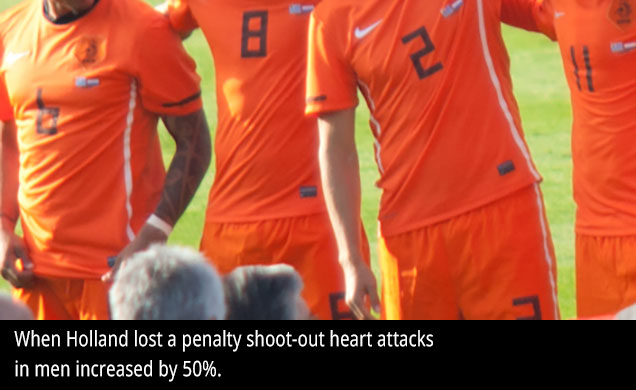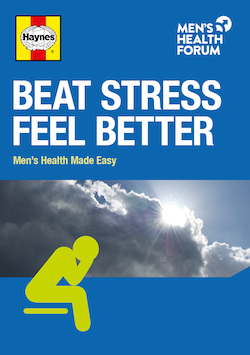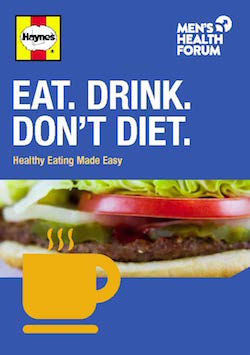World Cup Survival Guide

Get off the bench
Warming the bench is fine for Frank Lampard but not for you.
A sedentary lifestyle - better known as sitting on your backside a lot - is dangerous. Human beings are designed to run about (did you hear me, Paulinho?)
Long periods of physical inactivity - eg. watching three World Cup games on the spin - increase your risk of heart disease, diabetes, cancer and obesity.
Australian research even suggests that every daily hour spent in front of the TV increases the risk of heart disease by 18%.
Get off the couch and go for a walk. (This will also enable you to avoid those shocking half-time ads with Ray Winstone.)
Make smarter substitutions
World Cup managers live or die on the quality of their substitutions. Make some smart ones of your own when choosing the World Cup takeaway.
Pizza
Italy have already broken our hearts once, don’t let it happen again by choosing the wrong pizza. Opt for veggie toppings. (Five a day is not just the target number of fouls for each member of the Honduran team.) Try a pizza without cheese and drop the garlic bread - pick Bruschetta instead. (That’s toasted ciabatta with tomatoes and herbs not Italy’s left back.)
Kebab
Look no further than Greece’s 3-0 defeat by Columbia for the dangers of too many kebabs. Choose shish (the skewered meat) instead of doner (the reconstituted stuff) with brown pitta and salad.
Burgers
Burgers are like football - best kept simple. Have a grilled burger with salad, tomato and a little relish. Avoid the creamy dressings, cheese, bacon and anything battered or breaded.
Make your own
You can easily make what they serve outside Portuguese footie grounds at home. Marinade beef or pork thinly sliced as long as possible in white pepper, white wine and garlic. Pan fry in a splash of oil for a minute or two and put between two slices of bread. Cristiano Ronaldo won’t eat anything else after a long hard 90 minutes moaning at his less talented team-mates.
Order food before you start drinking.
This reduces the risk of you ordering the double deep-fried fat ball with cream and sugar. (The same applies to betting by the way. Just one drink can cloud your judgement leading to a bet on England.)
Pace yourself
Spain lost their first game at the 2010 World Cup but still won the tournament.
‘It’s a marathon not a sprint’ (© all football managers) so follow our drinking rules and you won’t make too many misplaced passes or lose your shape in the last third:
- don’t drink on an empty stomach
- have the odd soft drink or better still, glass of water
- generally a clearer liquid means less of a hangover
- drink water before bed and in the morning
- give your liver a few days off (at least 48 hours)
- don’t drive and know how you’re getting home
- don’t mix drinks (and that includes so called energy drinks)
The NHS advise men not to regularly drink more than 3-4 units of alcohol a day - that’s a couple of pints of lower strength beer.
Get some sleep
Many of the games at the World Cup kick off late.
Loss of sleep - even a few hours for a few days - affects mood and judgement.
A short nap can give you a boost without affecting your night’s sleep. (It can also help your memory enabling you to remember the excuse you gave your boss for nipping off early to catch the 5pm kick-off.)
Nap for 20-30 minutes (about the same amount of time it takes to stop being amazed that Thierry Henry is wearing a cardigan in 95% humidity without breaking sweat.)
How to deal with the inevitable
The best preparation for an England World Cup is a lifetime supporting Tottenham Hotspur but if you haven’t had the benefit of this thorough apprenticeship in humiliation, here are some tips to beat depression if and when your team gets knocked out:
- take some exercise
- sing (as if you’re winning - ‘Bright side of life’ perhaps)
- have sex (“I haven't felt that good since Archie Gemmill scored against Holland in 1978” © Trainspotting)
- do something you enjoy (eg. watch the cricket or tennis)
- do something different (eg. fill in your wall chart with a different colour pen)
- be mindful - enjoy the emotions of the journey, let the sensations of defeat flood over you like an English summer downpour, safe in the knowledge that with each moment that passes you’re feeling better and will continue to feel better until Euro 2016
- talk about it - the best tip for dealing with any problem
- look forward to the next game
It could be worse. There are 209 nations in Fifa and only 32 of them are at the World Cup.
How to survive a penalty shoot-out
The day England lost to Argentina on penalties in 1998, male hospital admissions for heart attack increased by 25%.
On the day the Dutch, who take their football even more seriously and are even worse at penalties, were knocked out of Euro 96 on penalties by France, male heart attacks increased by 50%. (Against France, the Netherlands missed just one penalty. Imagine the carnage after the semi-final of Euro 2000 when they missed five penalties against Italy.)
Here’s the thing: getting angry about losing a penalty shoot-out is like getting angry at the rain for raining, the birds for singing or Luis Suarez for diving. It’s going to happen. Even Germany only have win-percentage of 71%. (England's is 17%!)
- Don’t drink or eat too much,
- don’t hold your breath and
- just assume the players will miss and you'll lose.
Then be pleasantly surprised if they don’t. It's a glass half-full, glass half-empty thing.
| The Men’s Health Forum is committed to fully participating in NHS England’s Information Standard Scheme for health and social care information. This is not health information as such but a bit of World Cup fun. Although it is NOT updated regurlarly in line with the Information Standard, references for all the statistics and health and medical claims at the time of writing are available below. |
Date published
20/06/14
Date of last review
20/06/14
Date of next review
20/06/18
References
|
The Men’s Health Forum need your support It’s tough for men to ask for help but if you don’t ask when you need it, things generally only get worse. So we’re asking. In the UK, one man in five dies before the age of 65. If we had health policies and services that better reflected the needs of the whole population, it might not be like that. But it is. Policies and services and indeed men have been like this for a long time and they don’t change overnight just because we want them to. It’s true that the UK’s men don’t have it bad compared to some other groups. We’re not asking you to ‘feel sorry’ for men or put them first. We’re talking here about something more complicated, something that falls outside the traditional charity fund-raising model of ‘doing something for those less fortunate than ourselves’. That model raises money but it seldom changes much. We’re talking about changing the way we look at the world. There is nothing inevitable about premature male death. Services accessible to all, a population better informed. These would benefit everyone - rich and poor, young and old, male and female - and that’s what we’re campaigning for. We’re not asking you to look at images of pity, we’re just asking you to look around at the society you live in, at the men you know and at the families with sons, fathers and grandads missing. Here’s our fund-raising page - please chip in if you can. |




